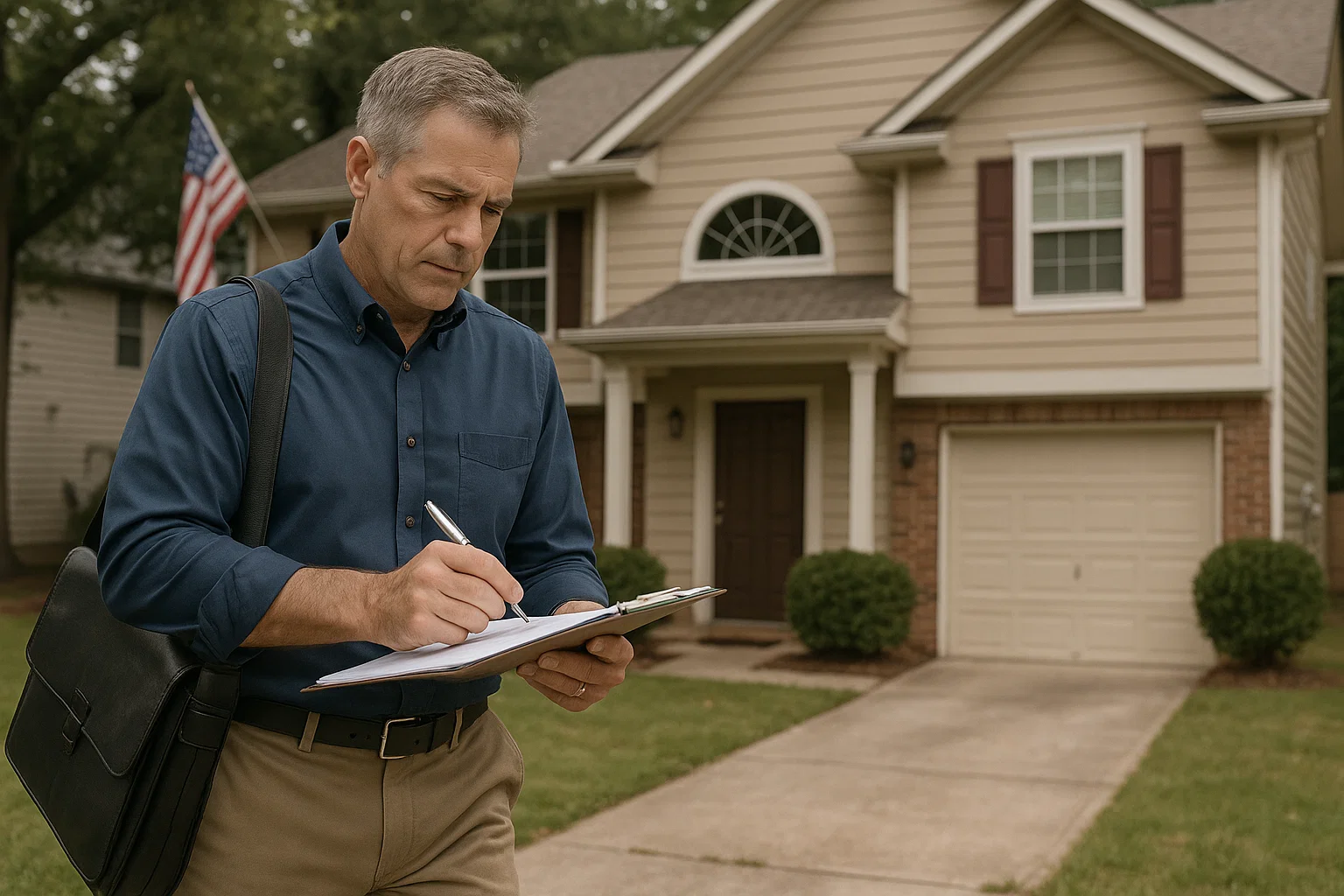.png)
Understanding VA loan limits and property requirements is crucial for maximizing your homeownership benefits, as VA closing costs and first-time home buyer advantages only apply to properties meeting strict standards. The Department of Veterans Affairs establishes Minimum Property Requirements (MPRs) that ensure homes financed through VA loan refinance programs or initial purchases meet safety, structural, and habitability standards. These requirements protect veterans from purchasing problem properties while maintaining the integrity of the VA loan program for future generations of service members.
Are you concerned that your dream home might not qualify for VA financing due to property condition issues, or wondering exactly what standards the VA requires for loan approval? Many veterans discover property requirement complications late in their homebuying process, potentially derailing purchases and costing valuable time and money. Today we'll provide comprehensive coverage of VA Minimum Property Requirements, explain how these standards interact with loan limits and closing costs, and discuss strategies for first-time buyers and refinancing veterans to navigate property challenges successfully. Whether you're evaluating a fixer-upper or concerned about specific property features, this guide will prepare you for every aspect of VA property requirements.
VA Minimum Property Requirements Overview
VA Minimum Property Requirements (MPRs) ensure that all VA-financed properties are safe, structurally sound, and sanitary while providing adequate security for the loan guaranty. These standards go beyond basic habitability to include specific requirements for access, utilities, mechanical systems, and structural integrity that protect veterans from purchasing properties with fundamental deficiencies.
Year-round access represents a critical requirement, with properties needing independent access that doesn't rely on neighbors' property and adequate space between buildings for exterior maintenance. Safe pedestrian or vehicular access from public or private streets with all-weather surfaces ensures properties remain accessible regardless of seasonal conditions or weather events.
Residential space requirements mandate that properties have at least 75% residential use with dedicated spaces for living, sleeping, cooking, and dining. Multi-unit properties up to four units must share laundry, storage, and utility facilities while maintaining separate shutoffs for water, sewer, gas, and electrical systems for each unit.
Structural and Safety Standards
Structural integrity assessments examine foundations, load-bearing elements, and overall construction quality to ensure properties can safely support occupancy loads and withstand normal environmental stresses. Mechanical systems must be appropriately sized, in good working condition, and properly exposed for maintenance and safety inspections.
Electrical systems require adequate capacity for lighting and necessary equipment with no visible frayed or exposed wiring that could create fire hazards or safety risks. Permanently installed heating systems must maintain temperatures of at least 50 degrees Fahrenheit in areas with plumbing, though air conditioning is not required unless already installed and must function properly.
Water supply systems whether municipal or well-based must provide continuous safe drinking water with adequate hot water heating capacity. Shared well systems require sufficient capacity for simultaneous use by all units, protected connections, and proper maintenance agreements between property owners.
Property Type Eligibility and Restrictions
Eligible property types for VA financing include single-family homes, condominiums in VA-approved projects, manufactured homes meeting HUD standards, and multi-unit properties up to four units when veterans occupy one unit as their primary residence. Investment properties and vacation homes are specifically excluded from VA financing eligibility.
Condominium eligibility requires VA approval of the entire project, with the VA maintaining lists of approved developments that meet specific financial and legal standards. New condominium projects can apply for VA approval, though the process may take several months and requires comprehensive documentation of homeowner association finances and legal structure.
Manufactured home requirements include permanent foundations, HUD compliance certification, and real property classification rather than personal property status. Mobile homes must be permanently affixed to foundations and connected to utilities in approved manufactured housing communities or on owned land.
Primary Residence Occupancy Requirements
Occupancy mandates require veterans to establish primary residence within 60 days of closing and maintain continuous occupancy for the majority of each year. Military deployment or temporary duty assignments don't typically violate occupancy requirements when dependents occupy the property or when military orders prevent immediate occupancy.
Permanent Change of Station (PCS) moves after establishment of primary residence don't violate VA loan terms, allowing veterans to convert properties to rental investments while using remaining entitlement for new primary residences. Temporary relocations for employment, education, or family circumstances may be permitted with proper documentation and lender approval.
Rental property conversions from former primary residences remain acceptable under VA loan terms, though veterans should maintain documentation of initial occupancy compliance and reasons for relocation to support their position if questioned during future VA loan applications.
VA Appraisal Process and Requirements

VA appraisals serve dual purposes of establishing market value and verifying MPR compliance, conducted by VA-approved appraisers familiar with program-specific requirements. Appraisal ordering typically occurs early in the loan process to identify potential issues before extensive transaction costs accumulate.
Notice of Value (NOV) documents provide official property valuations, condition assessments, and lists of required repairs that must be completed before closing. Required repairs identified during appraisal must be completed by qualified contractors and re-inspected to ensure compliance with VA standards.
Appraisal appeals are available when veterans believe property values are understated or required repairs are excessive or inappropriate. Market data supporting higher valuations and contractor opinions on repair necessity can support successful appeals, though the process may extend closing timelines.
Common Property Issues and Solutions
Septic system problems frequently arise during VA appraisals, with failing systems, inadequate capacity, or code violations requiring professional remediation before loan approval. Well water issues including contamination, inadequate flow rates, or shared system complications may necessitate water treatment installations or system upgrades.
Electrical code violations such as outdated wiring, insufficient capacity, or safety hazards require licensed electrician repairs and local code compliance verification. HVAC system deficiencies including inadequate heating capacity, safety concerns, or code violations must be professionally addressed before closing.
Structural concerns ranging from foundation settling to roof damage require professional evaluations and appropriate repairs that may involve significant costs and extended timelines. Pest damage including termite infestation or wood-destroying organism damage must be professionally treated and structurally repaired when necessary.
Cost Implications and Budgeting

Repair costs for VA-required improvements can impact closing budgets significantly, making preliminary property assessments crucial during home shopping phases. Seller repair responsibilities versus buyer obligations depend on contract negotiations and local customs, though VA requirements remain non-negotiable for loan approval.
VA loan closing costs may increase when extensive repairs require additional inspections, permit fees, or extended processing timelines. Seller concessions up to 4% of purchase price can help offset repair costs, though veterans should budget for potential out-of-pocket expenses when concession limits are insufficient.
Contingency planning should include alternative financing options or property alternatives when repair costs exceed budgets or seller cooperation is unavailable. Professional consultations with contractors, real estate agents, and loan officers help assess feasibility of problem properties before extensive commitments.
Strategic Property Selection
Pre-purchase planning should prioritize properties likely to meet MPRs to avoid complications and delays during loan processing. Recently constructed homes, well-maintained properties, and homes in good neighborhoods typically encounter fewer VA appraisal issues than fixer-uppers or distressed properties.
Professional inspections before contract execution can identify potential MPR issues early, allowing informed decisions about offer terms, repair negotiations, or property alternatives. VA-experienced real estate agents understand common MPR issues and can guide property selection toward VA-friendly options.
Investment property transitions require understanding of how VA occupancy requirements transition to rental property management while maintaining compliance with original loan terms. Professional property management and proper documentation help veterans transition from homeownership to real estate investment successfully.
Understanding VA loan property requirements ensures veterans can navigate the homebuying process efficiently while maximizing their military benefits and avoiding costly surprises that could derail homeownership goals or compromise financial planning throughout their military and civilian careers.

Alex Chen

Alex Chen













Get in touch with a loan officer
Our dedicated loan officers are here to guide you through every step of the home buying process, ensuring you find the perfect mortgage solution tailored to your needs.
Options
Exercising Options
Selling
Quarterly estimates
Loans
New home

Stay always updated on insightful articles and guides.
Every Monday, you'll get an article or a guide that will help you be more present, focused and productive in your work and personal life.









.png)
.png)
.png)
.avif)
.avif)
.avif)
.png)
.png)
.png)
.avif)
.png)
.png)
.avif)
.png)
.avif)
.png)
.avif)
.avif)